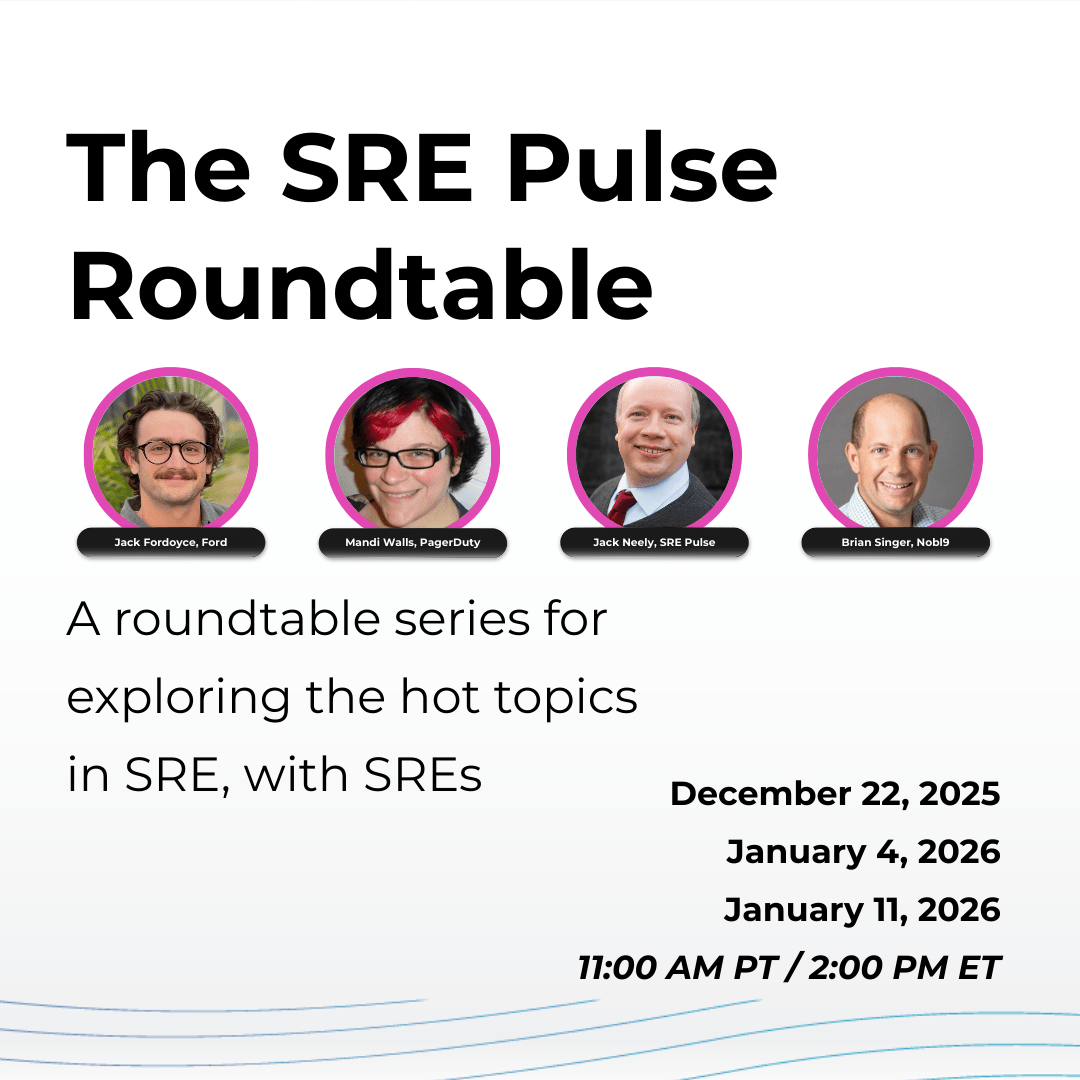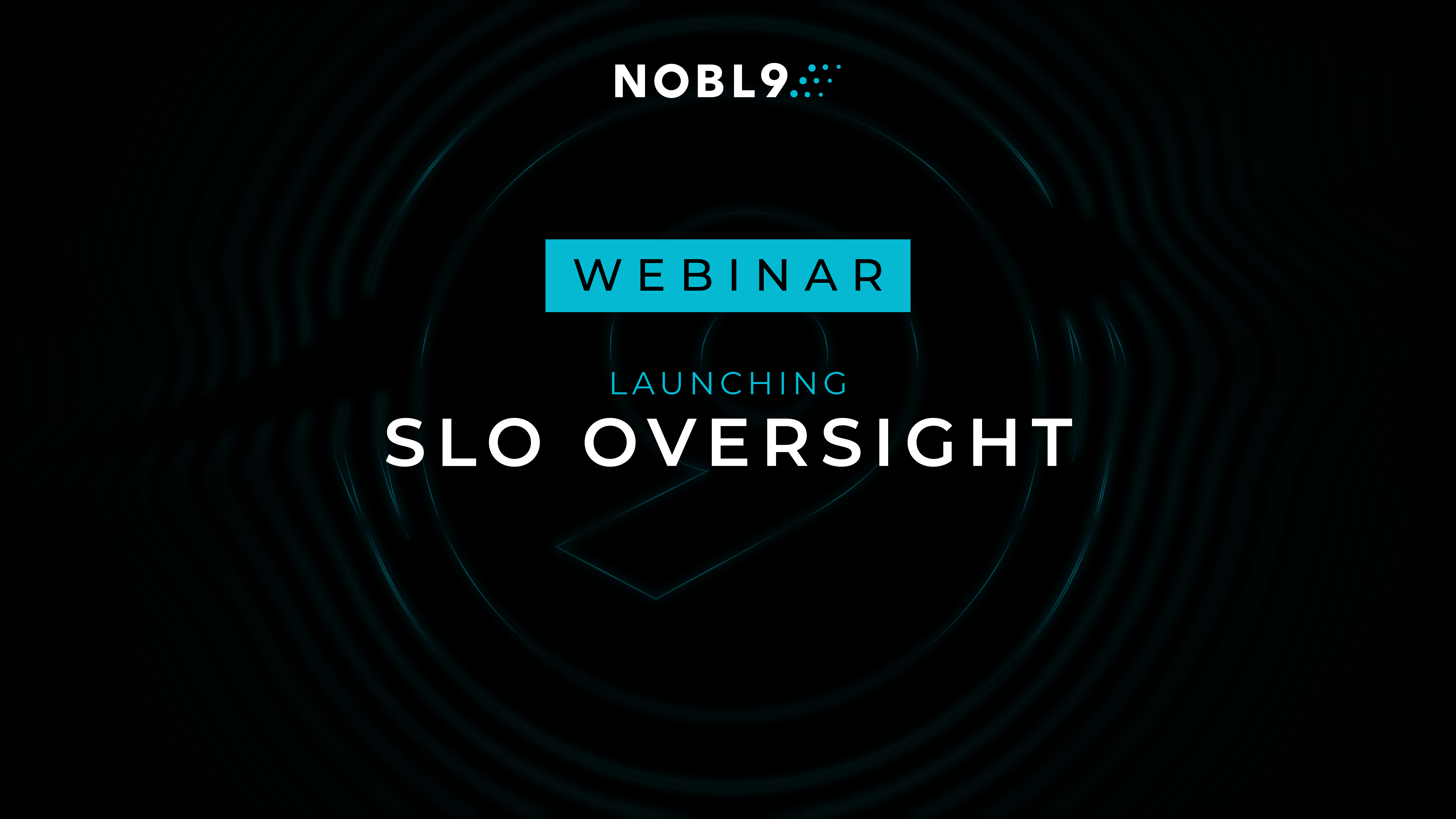Powered by Service Level Objectives
SLOs that scale with you
Giving SRE and engineering teams the context they need to balance reliability, speed, and cost
*Get a feel for the platform - no account, no configuration needed.
The Pulse of SRE
In this SRE Pulse Roundtable, practitioners from organizations like Ford and PagerDuty share how they run reliability week to week. Expect concrete examples from on call, incident review, SLO upkeep, and stakeholder conversations. The webinar will be moderated discussion hosted by Brian Singer, Co-founder and CPO at Nobl9 who has experience helping organizations at all sizes scale reliability strategy.








Why Nobl9 Exists
Reliability comes with costs and tradeoffs. Nobl9 gives you the tools to manage them with confidence.
Nobl9 exists to answer the most important question in software: Is my service reliable enough for my users? We take your existing monitoring data and layer on Service Level Objectives (SLOs) to turn raw signals into meaningful insights. With powerful tools to manage and govern SLOs at scale, Nobl9 gives you the clarity to prioritize engineering work, align teams, and deliver a better customer experience.
You Don't Need More Data
Your monitoring stack already captures everything: latency, errors, uptime, logs, traces. But, how do you decide what matters to your customers before they start complaining?
Service Level Objectives connect reliability to customer experience. They define acceptable boundaries for your service, based on how users actually experience it, instead of arbitrary thresholds or vanity metrics.
When reliability is managed through native dashboards and alerts, it turns into a reactive numbers game. Teams get flooded with noise. They are forced to respond without context, and are left without a way to prioritize, plan ahead, or connect their work to customer expectations.
New to SLOs? Check it Now!
Articles and Webinars
The Nobl9 Mobile App — Stay on Top of Reliability, From Anywhere
Manage SLO-based alerts on the go with the Nobl9 Mobile App for iOS and Android, ensuring service reliability from anywhere.
Read MoreReliability and SLOs at Scale: Key Lessons from the SRE Pulse Roundtable
Key lessons from the SRE Pulse roundtable on scaling reliability and SLOs, featuring insights on enhancing user experiences.
Read MoreBuilding Resilient Systems: Nobl9 Achieves the AWS Resilience Software Competency
Nobl9 achieves AWS Resilience Software Competency, enhancing reliability and resilience for digital experiences by aligning reliability goals with engineering realities. Learn how we can help your systems endure.
Read MoreBlack Friday is the ultimate reliability stress test
Prepare for Black Friday's digital surge by enhancing reliability with SLOs. Discover how leading retailers excel under pressure and ensure seamless customer experiences.
Read More2025-08-20 Assessing SLO Maturity Webinar
Learn to assess and enhance your SLO maturity with practical insights from SRE consultant Amin Astaneh, driving better reliability outcomes for your business.
Watch Now!Case Studies and Reports
Read AllAWS & Nobl9 Case Study: Reliability in a Global Ticketing Platform
Learn moreAWS & Nobl9 Case Study: Scaling Reliability Across Complex Systems
Learn moreWhite Paper and Case Study: Mastering SLOs for ROI, Reliability and Cost Savings
Learn moreIDC Report - 7 Steps to Creating Effective SLOs | Nobl9
Learn moreA Guide to Reliability Platform Selection and Discussing Build Vs. Buy
Learn moreWhat Every CEO Needs to Know about SLOs | Nobl9
Learn moreEverything in Nobl9
is designed to support the creation and management of SLOs in modern engineering environments:
- SLO creation that’s guided, policy-based, and scalable
- Full integration with your development lifecycle through GitOps, CI/CD, and APIs
- Visibility across systems and services, no matter where your data comes from
- Alerts that reflect real user pain, not just raw thresholds
- Reporting that connects reliability to product, operations, and business priorities

No one's perfect...
Knowing what to measure is half the battle, and your teams don't all work the same way. We provide the structure and guardrails to make SLOs adoptable, trustworthy, and repeatable across teams, tools, and environments.
You don't need to start over.
You don't need to rip out your monitoring stack.
You just need the system that makes SLOs actually work.
Contact UsReliability is Mission Critical
Reliability is More Than Just Outages
We all know the devastating impact of outages - the loss of revenue, the hit to brand image, the churn, the PR nightmare, and the all-hands scrambling that backburners projects and pushes back future revenue streams. But reliability is more than just ensuring your application is available as often as possible - it’s also about ensuring that your application performs reliably on a daily basis.
In an environment where switching costs are negligible, customers have a low threshold of tolerance for underperforming experiences. For every outage, there are countless examples of poor, frustrating performance that go unseen by organizations. These micro-outages - sometimes affecting a small segment of users for a brief period of time, sometimes affecting just one user - are massive, hidden issues that prevent revenue-driving interactions and create churn.
Nobl9, with our SLO-centric approach to reliability, brings visibility to these occurrences, empowering product teams to quickly identify and bring attention to issues that don’t cause an outage but that negatively impact their users’ experience.
Tolerating Non-Critical Errors is Key to a Strategic Reliability Program
SLOs operate with what’s known as an “error budget,” that is, the number of times a Service Level Indicator (SLI) fails to meet its target metric. There is no such thing as a good error, but by testing SLIs over historical data when setting up an SLO allows you to identify an acceptable error rate.
Some errors should be considered non-critical - for example, an authentication gateway that immediately tries again when an error occurs should be considered less critical than a payments API that simply stops after an error. Using SLOs with Nobl9 allows you to be strategic with your error tolerance, putting emphasis on SLIs that directly impact or impede the customer’s journey. Doing so will allow you to not only focus your efforts on the everyday user experience, but to strategically distribute your IT investments into areas that affect your real business goals.
Don’t Make Your SREs Re-Invent the Wheel
Your engineers already have their preferred tools in place to monitor and observe their particular parts of your IT infrastructure. They may have Datadog, CloudWatch, Splunk, New Relic, etc. - however they’re capturing metrics, events, logs and traces, ripping it out and replacing it is both unnecessary and likely to be met with significant pushback.
Nobl9 is platform agnostic. Your engineering teams’ existing tools can be pulled in either via one of our purpose-built integrations or by using our SLI Connect data ingestion engine. Queries can be run using the data source’s native querying language, and your Nobl9 SLO will normalize the data for an accurate, actionable single pane of glass view of what matters most to your users’ daily experience.
Making Sense of the Data
An ongoing challenge in the world of site and application reliability is actually taking meaning from the metrics. Infrastructure and application metrics are often extremely specialized, meaning that for anyone who isn’t an engineer focused on the system or service being measured may not be able to easily understand what the data actually means. Often this leads to de facto top-level metrics like nines of uptime.
Nobl9 makes it easy to understand the actual reliability of an application at a glance. Our Reliability Roll-Up Reports are incredibly useful, distilling the complexity of reliability of an application spanning a variety of systems and services into a percentage-based Reliability Score. With this, you’ll know at a glance how reliable your application actually is, without having to have a ton of technical knowledge and without oversimplifying everything into a count of nines.




.png)





.png?width=1200&height=628&name=Building%20Reliable%20E-commerce%20Experiences%20(42).png)
.png?width=1200&height=628&name=Building%20Reliable%20E-commerce%20Experiences%20(34).png)





.png)


.jpg?width=885&height=590&name=gr-stocks-Iq9SaJezkOE-unsplash%20(1).jpg)

